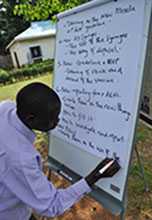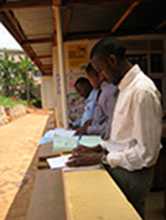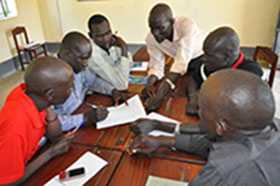Train, Motivate, Mentor: Strengthening Immunization Systems in East Africa

Taking notes at a training workshop in South Sudan, July 2012.
The “clues” were everywhere.
And in this case in rural South Sudan there were as many rumors as facts about an outbreak of yellow fever in Aweil, Northern Bahr el Ghazal State.
So when Surveillance Officer David Deng began investigating, he followed a newly-learned approach that stressed discipline, thoroughness and data. He followed proper investigative procedures and correctly identified the index case (the first person to become ill). With this information, he was able to correctly identify the source of the illness, project its spread and make recommendations to the Ministry of Health. His actions saved many people from getting sick, and may have saved lives. The officer had recently participated in the East Africa Training Project (EATP), and the skills he learned there informed his decisions in this outbreak investigation.
For some people it was a moment easily forgotten.
For CDC, though, it was affirmation. And for the people of South Sudan, it was a real-world example of how public health is improving thanks to a novel training program.
The techniques and process that the surveillance officer used successfully sprang from CDC’s Global Immunization Division and the Field Epidemiology Training Program. The program was made possible by funding from the Bill and Melinda Gates Foundation. The project has been implemented from 2012-2014 in Ethiopia, Uganda, and South Sudan, which were selected because of their risk for outbreaks of polio and other vaccine preventable diseases (VPDs).

Ugandan trainees take a study break.
The goals were as straightforward as they were powerful – reduce the risk of VPDs in two separate, but complementary, ways by strengthening and expanding the reach of district immunization and surveillance officers and also by improving national and local immunization systems. Strengthening the capacity of health officers produces tangible results, such as the South Sudanese surveillance officer successfully investigating a disease outbreak. Similarly, ensuring strong routine immunization systems will help children receive lifesaving immunizations against VPDs such as polio, measles, and pertussis to name just a few.
The project trains surveillance and immunization staff to detect diseases, effectively respond to outbreaks and how to manage a comprehensive immunization program.
The training uses two approaches. First, officers are trained in interactive workshops using presentations, case studies, discussion, field visits to clinics, and contests. Participants learn about topics that are important to immunization, disease detection, and outbreak response. Examples of topics covered include vaccine storage and management, increasing immunization coverage, vaccine safety, waste disposal, case investigation, communications and data collection methods.
Second, project mentors conduct monthly site visits with officers at their job sites for up to six months to support them and help them apply their news skills by completing job-related field projects.
Local immunization data can more effectively be analyzed and used for planning. Advice and solutions for navigating the inevitable barriers and challenges can be discussed together. Most of all, participants have two to three hours of uninterrupted access one-on-one to the mentor as a technical resource each month allowing questions to be asked, new skills to be practiced, and feedback provided.
“So often in immunization programs, training is strictly workshop-based,” Steven Stewart, a health educator in the Global Immunization Division who leads EATP, said. “And as any of us who have attended a training course can attest, we may use few or none of the things covered in a workshop once we return to work. This is why we think the repeated visits by the project mentors, who also helped facilitate the workshops, are key to getting the district officers to apply the new concepts and skills.”
“For example, during a visit, a mentor may suggest looking at the past three months’ program data with the immunization officer and help him or her analyze it for meaning and making decisions. The mentors are the bridge in helping trainees move from jotting down information in a workshop notebook to practicing new skills in a sustained way. At their best, they combine the qualities of a teacher, a supportive supervisor, and a technical coach,” Stewart said.
Mentors have noted that trainees are more confident in their skills and more motivated in their work. In fact, many trainees have already used their improved skills to make positive impacts in their countries.
An EPI officer in South Sudan shared his thoughts on the training. “The course has taught me a lot; I used to go out on supervision without knowing what to look out for; I simply used my own sense (intuition). Now I know how to analyze data, I can see the problem and begin to discuss,” he said.
Many participants have shared similar positive experiences. For instance, a surveillance officer from Uganda said, “Since the training, I just fell in love with data.”
This is very useful feedback, because knowing how to collect, analyze and use data is essential in the efforts to protect children and adults from vaccine preventable diseases. CDC’s Dr. Patricia Tanifum, the regional epidemiologist for the project who’s based at CDC-Uganda, explains that using information from analyzed data leads to evidence-based prioritization. She says this allows limited resources to be directed to underserved communities that are at higher risk for outbreaks.

South Sudanese immunization officers working on a case study to apply new knowledge.
Several Ugandan trainees, for example, used their field project to learn why there was low vaccination coverage in their districts. By conducting focus groups with parents, they learned that mothers did not understand the need for repeated immunization visits and did not have transport/fuel to reach vaccination sites. Also, during the rainy season reaching vaccination sites was difficult. The officers shared this information with health center managers and community leaders and opened previously closed outreach sites to increase access to vaccination.
WHO country staff in Ethiopia have praised the project, noting the improved knowledge and skills of the trainees. They also feel that activities such as completing field projects, along with conducting an operations research project, and using indicators to demonstrate impact, have been especially valuable.
With support from partners such as the Ministries of Health, WHO, IntraHealth International and the African Field Epidemiology Network, public health officers in Ethiopia, South Sudan and Uganda have increased their core competencies and are better positioned to prevent, detect, and manage VPDs in their countries.
Already a domino effect of sharing knowledge has commenced, with immunization officers and surveillance officers sharing data and best practices with each other and their fellow health workers.
Due to its success, the East African Training Project, originally planned for 18 months, received funding so it could continue for another year (through mid-2014). The extension means even more officers will develop the skills necessary to protect the children in their country from deadly but vaccine-preventable diseases.
- Page last reviewed: May 19, 2014
- Page last updated: May 19, 2014
- Content source:
Global Health
Notice: Linking to a non-federal site does not constitute an endorsement by HHS, CDC or any of its employees of the sponsors or the information and products presented on the site.


 ShareCompartir
ShareCompartir